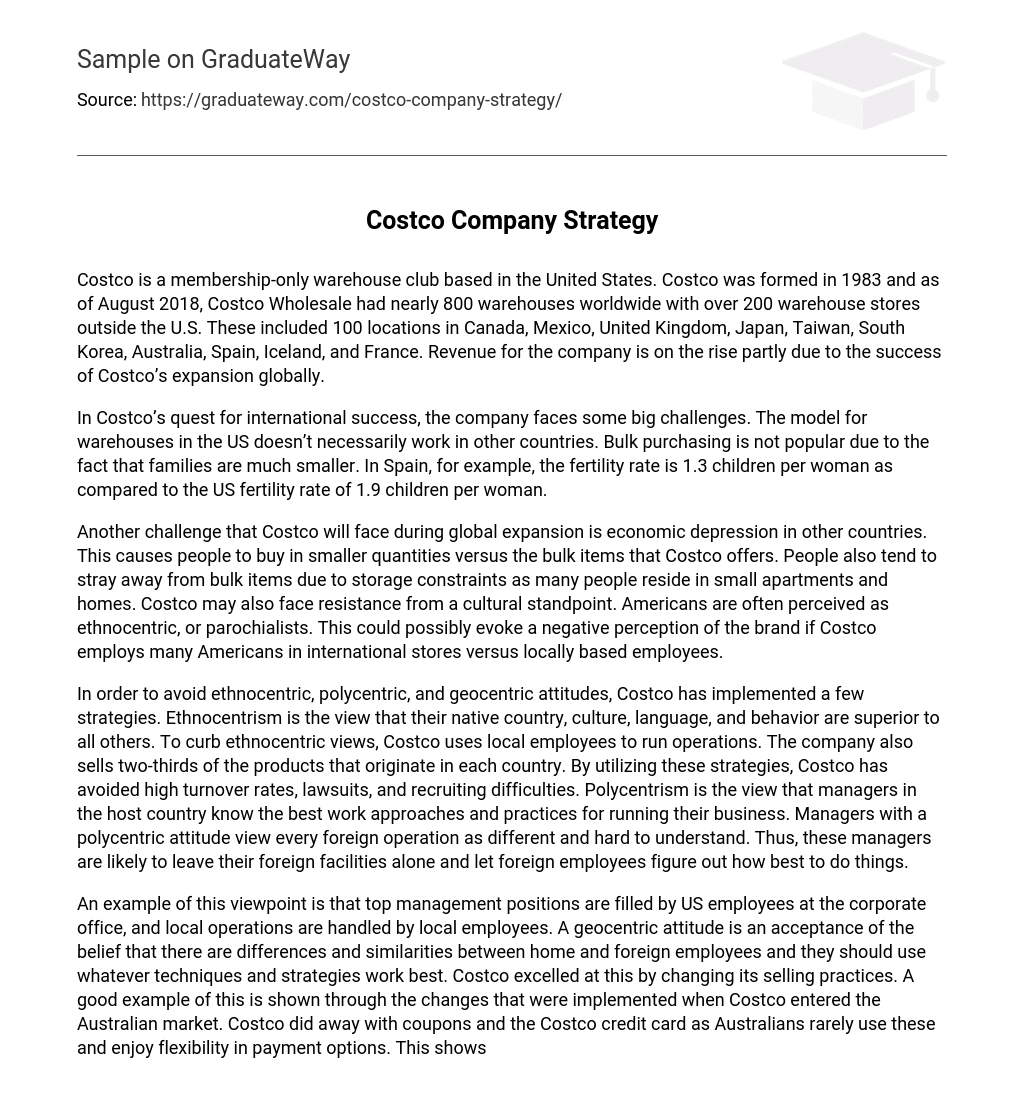Costco is a membership-only warehouse club based in the United States. Costco was formed in 1983 and as of August 2018, Costco Wholesale had nearly 800 warehouses worldwide with over 200 warehouse stores outside the U.S. These included 100 locations in Canada, Mexico, United Kingdom, Japan, Taiwan, South Korea, Australia, Spain, Iceland, and France. Revenue for the company is on the rise partly due to the success of Costco’s expansion globally.
In Costco’s quest for international success, the company faces some big challenges. The model for warehouses in the US doesn’t necessarily work in other countries. Bulk purchasing is not popular due to the fact that families are much smaller. In Spain, for example, the fertility rate is 1.3 children per woman as compared to the US fertility rate of 1.9 children per woman.
Another challenge that Costco will face during global expansion is economic depression in other countries. This causes people to buy in smaller quantities versus the bulk items that Costco offers. People also tend to stray away from bulk items due to storage constraints as many people reside in small apartments and homes. Costco may also face resistance from a cultural standpoint. Americans are often perceived as ethnocentric, or parochialists. This could possibly evoke a negative perception of the brand if Costco employs many Americans in international stores versus locally based employees.
In order to avoid ethnocentric, polycentric, and geocentric attitudes, Costco has implemented a few strategies. Ethnocentrism is the view that their native country, culture, language, and behavior are superior to all others. To curb ethnocentric views, Costco uses local employees to run operations. The company also sells two-thirds of the products that originate in each country. By utilizing these strategies, Costco has avoided high turnover rates, lawsuits, and recruiting difficulties. Polycentrism is the view that managers in the host country know the best work approaches and practices for running their business. Managers with a polycentric attitude view every foreign operation as different and hard to understand. Thus, these managers are likely to leave their foreign facilities alone and let foreign employees figure out how best to do things.
An example of this viewpoint is that top management positions are filled by US employees at the corporate office, and local operations are handled by local employees. A geocentric attitude is an acceptance of the belief that there are differences and similarities between home and foreign employees and they should use whatever techniques and strategies work best. Costco excelled at this by changing its selling practices. A good example of this is shown through the changes that were implemented when Costco entered the Australian market. Costco did away with coupons and the Costco credit card as Australians rarely use these and enjoy flexibility in payment options. This shows a willingness to use whatever strategies works most effectively.
Employees in the United States dramatically differ from foreign employees in a few ways. They are known to be much more dominant and confrontational in social situations. Americans are also very performance-driven and place a high value on improvement and excellence in the workplace. Employees from Spain may butt heads with Americans on the dimension of humane orientation and employees from China may deal with the cultural difference of gender equality with American employees. The company could reduce unintended consequences through learning the cultural tendencies of foreign business partners. Knowing the cultural tendencies could give the company a competitive advantage.
A few of the most important lessons to be learned about global management from this case include the importance of having some knowledge about the language, skills in communication, understanding of the culture, and familiarizing oneself with the geographical area. In this case study, Costco succeeded at adopting a global mind-set, they’ve adapted to local economies by being open and aware of cultural differences and by adjusting their business model to adapt to those differences.
In today’s global economy, companies must learn to stretch beyond their cultural comforts – that means knowing more than how to navigate foreign subway systems or quickly calculate currency conversions. It means being open to understanding the factors that go into how business is done internationally, why it’s done that way, and why it matters. Learning about differences in a country’s culture, religion, politics, and history can offer insight into how business is conducted, how people might react to you, your team and business proposal, and what kinds of outcomes can be expected. Gaining this understanding takes time and effort, but the benefits that come from doing enough research are very worthwhile.
Works Cited
- Farfan, Barbara. Costco’s Retail Innovation Craze . 03 January 2019. 25 January 2019 .
- Kinicki, Angelo and Brian K. Williams. Management: a practical introduction. New York: McGraw-Hill Education, 2018.
- Smith, Sandra. Succeeding in international business: observe and learn. 9 April 2018. 25 January 2019 .
- Team, Trefis. Costco’s International Expansion Plans Will Boost Growth. 17 April 2015. 2019 January 2019 .





